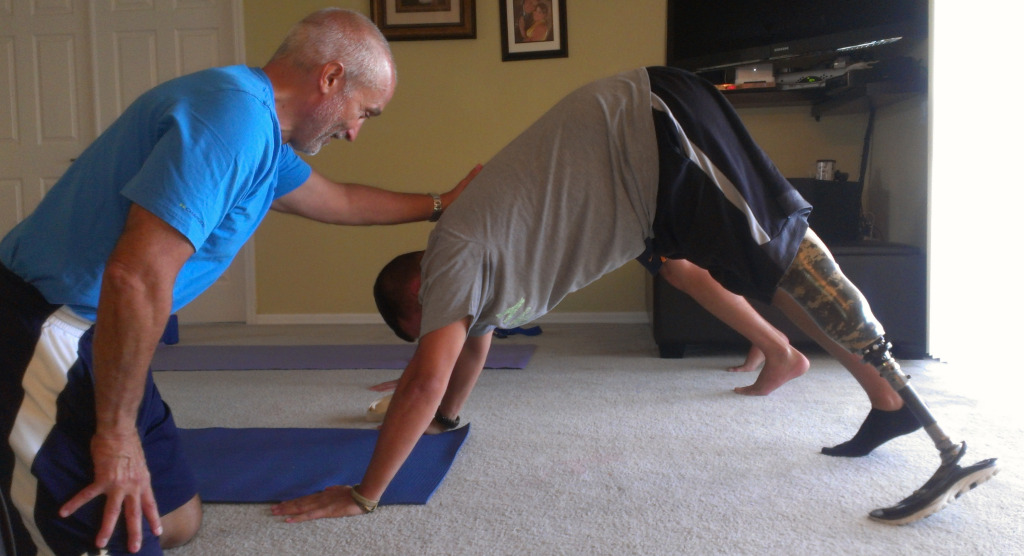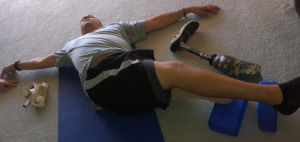The soldier meets the yogi
By Nancy B. Loughlin
Published in News Press on July 23, 2013. Posted with permission.
Night after night, American troops patrolled Iraqi streets.
SPC Joel Morera, raised in Clewiston, was a team leader and a military policeman.
He served three tours. It was three tours of RPGs, IEDs and pop shots from supposedly-vacant buildings. It was three tours of breaching doors, raiding homes and neutralizing threats. It was three tours of friends burned, blown to bits and disarticulated.
In July 2007 his left leg was blown off by an IED.
(In the film above Joel talks about his experience in Iraq and his difficulty in answering “that question.”)
Morera lives in Cape Coral, and he’s continuing his education at Edison College this fall, 12 credits away from his AS degree. He’s a father of two young sons, Joey and Jayden, with his wife of ten years, Ana.
But, regardless of his medical discharge, he’s still on active duty.
At night, he slips into his Jeep and patrols the roadways. He drives for hours by himself, in the silence, guarding the dark streets.
His wife has noticed he’s prone to quicker anger, and he’s less outgoing than he used to be.
Morera is reluctant to use the term “post-traumatic stress disorder,” a malady he once called a joke, a mere state of mind. Historically, he would have been in good company as war-related trauma was considered weak character. Yet, the documentation of war’s psychological impacts reaches to antiquity. PTSD symptoms are numerous but can include flashbacks, bad dreams, lingering memories, depression, disassociation, memory blackouts, anger outbursts, tremors or on-edge startle reactions.
Simply stated, people with PTSD are not present, frequently visiting or even stuck in past trauma. PTSD is not isolated to war veterans but afflicts anyone who has experienced a traumatic life event including violent crime, sexual assault, accidents or prison.
But PTSD sufferers can live in the present. Last week, Morera met Gary Granza, a SW Florida yogi trained by Warriors at Ease, an organization dedicated to teaching yoga in a military setting.
Granza will say this is not “foo-foo” yoga in his Astoria, Queens accent and attitude to match. He calls himself “a regular guy.”
“The vets know that they are in for something slightly different. We will open and stretch the body to ease the fluctuations of the mind,” Granza said.
A PTSD class centers on the breath and links it to slow mindful movement that can be transferred to real life situations such as walking meditatively through the supermarket, waiting in line, washing the car or taking a shower. Linking breath with movement holds the student in the now, a counterbalance to PTSD.
Granza emphasizes deep abdominal twisting not only to release toxins, but to calm the central nervous system. He integrates Qigong’s long, flowing breath with Tai Chi’s slow, mindful movements to connect energy centers.
A class to heal PTSD does not involve cardio or power building that might ignite fight-or-flight. In the tradition of Budokon, a hybrid of martial arts and yoga, speed hides deficiencies.
This class is about settling down and finding peace with wars of the past.
For more information, visit Granza’s website:www.gyogi.com. Click on the online edition to listen to Joel Morera tell his story.


